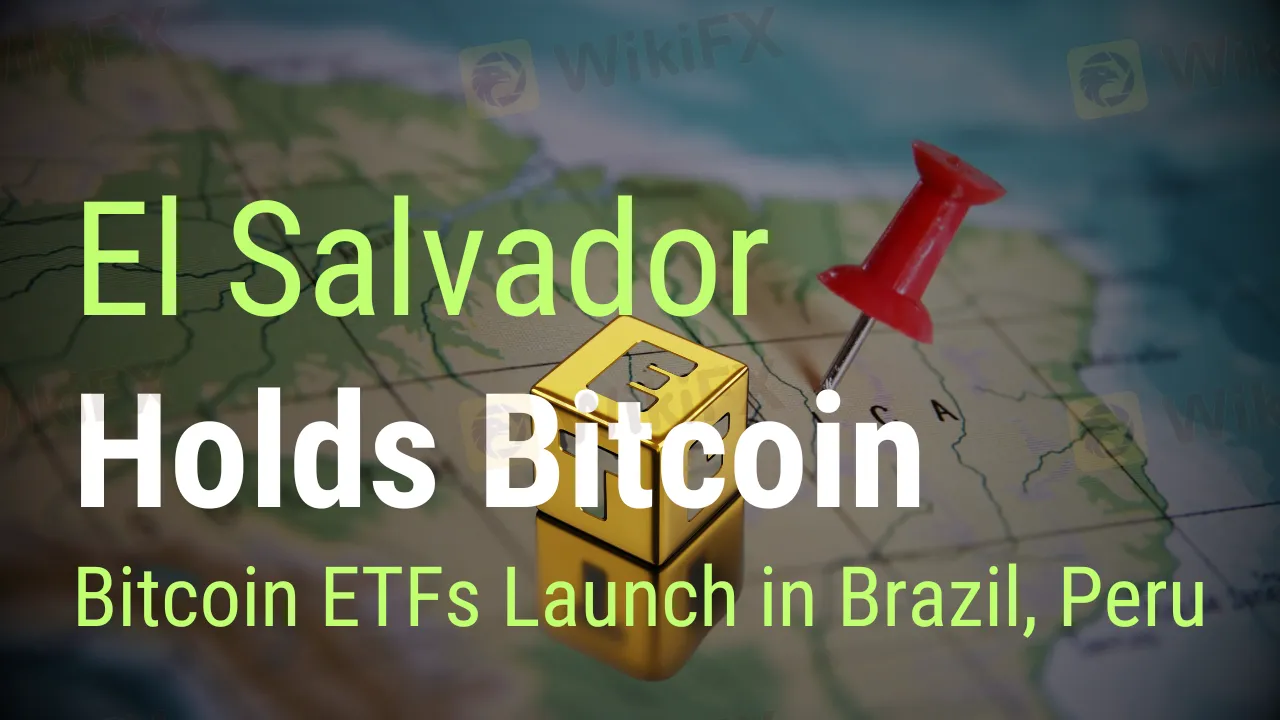简体中文
繁體中文
English
Pусский
日本語
ภาษาไทย
Tiếng Việt
Bahasa Indonesia
Español
हिन्दी
Filippiiniläinen
Français
Deutsch
Português
Türkçe
한국어
العربية
El Salvador Holds Bitcoin; Bitcoin ETFs Launch in Brazil, Peru
Abstract:El Salvador's President confirms Bitcoin reserves; Bitcoin ETFs launch in Brazil & Peru. Argentina targets central bank money issuance. Read more.

El Salvador's President, Nayib Bukele, confirmed Bitcoin reserves. A prominent social media site was where Bukele addressed El Salvador's Bitcoin holdings due to volatile market values. Since September 2021, when the government legalized Bitcoin alongside the US currency, it has garnered praise and criticism. However, Bukele underlined the long-term perspective and the likelihood of returns for El Salvador's bitcoin holdings in the current market.
According to Bukele, selling now may provide substantial profits, with earnings of more than 40% predicted, notwithstanding prior concerns spread about potential losses during periods of low market prices. He also explained the evolving nature of El Salvador's Bitcoin acquisition, pointing out that the country's citizenship program now serves as the primary route for acquiring Bitcoin. Despite market fluctuations, the President's assertion that “1 BTC equals 1 BTC” demonstrates the government's steadfast commitment to holding onto its digital asset holdings.
Meanwhile, the launch of Bitcoin spot exchange-traded funds (ETFs) has opened up new cryptocurrency investing opportunities for conventional investors in Brazil and Peru. The biggest stock market in Brazil, B3, is home to the launch of the iShares Bitcoin Trust ETF (IBIT39). Brazilian Depositary Receipts (BDRs), which allow authorized investors to participate in this effort, intend to improve accessibility in the future. Karina Saade, the head of the management responsible for the ETF in Brazil, hailed the launch as a significant milestone for the financial industry.

In Peru, the Lima Stock Exchange (BVL) provides bitcoin ETFs. A recent press release states that investors in Peru may now use the BVL platform to access Ishares Bitcoin Trust (IBIT), Vaneck Bitcoin Trust (HODL), and Invesco Galaxy Bitcoin (BTCO). This move demonstrates how Latin American traditional financial markets are integrating digital assets into their portfolios, generating interest in bitcoin investment opportunities.
Argentina's President Javier Milei is combating the nation's economic problems head-on, concentrating on money issuance by the central bank. Milei is working on a bill to restrict Argentine pesos for public aid. The proposed law aims to hold those responsible for sanctioning money production, particularly central bank officials, accountable. By making seigniorage a crime, Milei hopes to stabilize the money supply and reestablish confidence in Argentina's financial system.
Milei's proposal is a sign of broader efforts to restructure Argentina's economic policies and shows a commitment to fighting inflationary pressures and maintaining budgetary constraints. The proposed bill reflects the government's determination to address fundamental concerns threatening the economy and pave the road for long-term prosperity. Latin American governments responded to the quick shift in the financial environment by adopting Bitcoin and introducing ETFs, reflecting the rising popularity of cryptocurrencies as investment assets.

Disclaimer:
The views in this article only represent the author's personal views, and do not constitute investment advice on this platform. This platform does not guarantee the accuracy, completeness and timeliness of the information in the article, and will not be liable for any loss caused by the use of or reliance on the information in the article.
Read more

What Qualities of a Broker Help Professional Traders Achieve Success?
Know the key qualities of a broker that professional traders need, from fast execution to robust security and 24/7 support, to enhance trading success.

Rising Oil Prices Signaling a Bullish Market Ahead - Check Here!
Oil prices climb with a sharp U.S. crude stocks drop and Venezuela tariffs. Russia-Ukraine talks limit gains. Get insights on Brent, WTI, and oil market trends.

Crypto-to-Cash Transfers Now Available for UK and Europe
Crypto-to-Cash transfers are now available for UK and Europe users through the eToro platform, enabling them to transfer crypto-assets to their wallets and convert them into cash for trading and investment.

Fake Website Forex Scam, Arrests Two for Duping 100+ Investors
Chennai Cyber Crime exposes forex trading scam, arrests two men for cheating 100+ investors via fake websites. Beware of fraudulent investment schemes.
WikiFX Broker
Latest News
Forex Market Outlook: Key Currency Pairs and Trading Strategies for March 24–28, 2025
Singapore Police Crack Down on Scams: $1.9M Seized, 25 Arrested
Gold Prices Swing Near Record Highs
XTB Opens New Dubai Office
Africa Cybercrime Bust: Over 300 Arrested in Fraud Crackdown
The Growing Threat of Fake Emails and Phishing Scams
Hong Kong Banks and Authorities Collaborate to Freeze Fraudulent Accounts Faster
SocialFi and the Forex Market: A New Era for Decentralized Social Trading?
Is Billion Bucks Fx Scam?
BaFin Halts USDe Token Issuance, Citing Serious Compliance Failures
Currency Calculator







